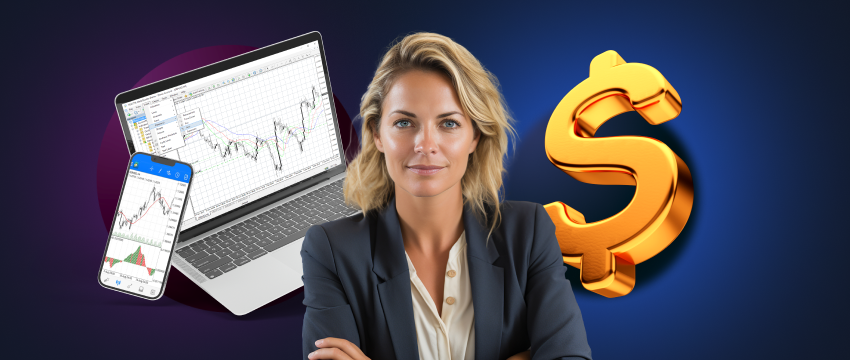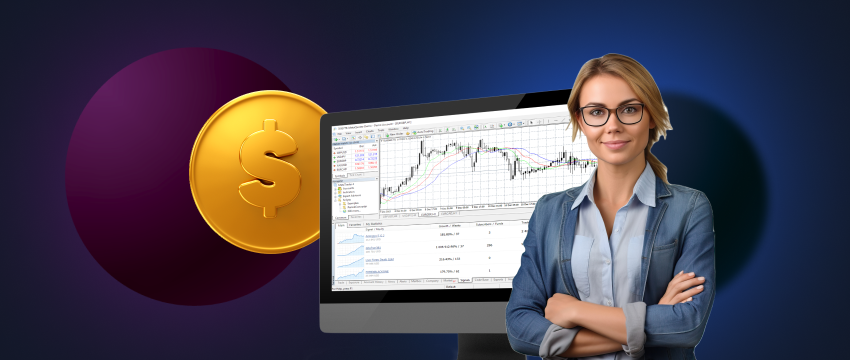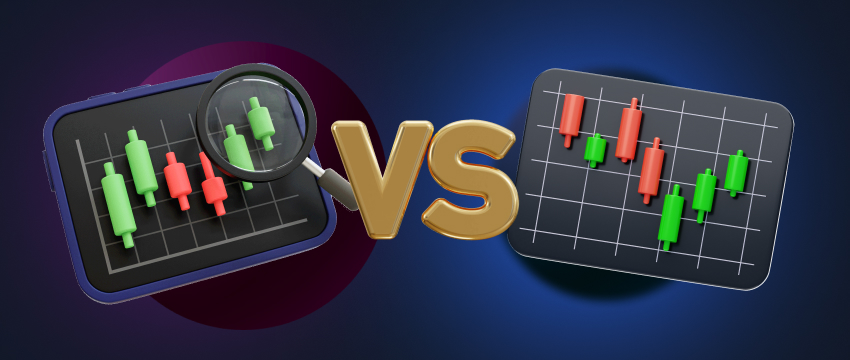While the short answer is yes, market manipulation can occur, though it’s not common. So, why the concern? The forex market operates in a decentralized manner, without a central exchange or governing body. This lack of central oversight can lead to concerns about the role of forex broker in potential market manipulation.
Despite the variation in participants, ranging from institutional traders to individual traders, no single entity or individual exerts control over prices.
Instead, factors like economic indicators, interest rates, geopolitical events, central bank announcements, trading agreements, and more impact currency prices.
Raising the question then, why are traders worried about a forex broker’s ability to manipulate the market? This is what we’ll be discussing in this blog.

Forex Broker’s ability to manipulate the market
What are the signs?
The forex market is incredibly large, phenomenally active, and highly volatile. This makes the detection of market or price manipulation considerably challenging to detect. But there are some signs to look out for, those tell-tale markers that provide some clue to distasteful trading behaviour. Let’s discuss some of them.
Spoofing
According to a 2023 Washington Post article, spoofing involves manipulating the market by using fake orders — orders that traders do not intend to execute. Placing fake orders lets spoofers nudge markets by creating a false picture of supply and demand, which moves prices in favorable directions.”
As a result, traders may suffer significant financial losses because the spoofer who initiated the transactions has no intention of following through on them. Due to a surge in demand, prices will inflate artificially, attracting more investors. Nevertheless, the spoofer will inevitably cancel the orders before completing them.
Spoofing is so dangerous that market manipulation using spoofing schemes primarily triggered the 2010 Flash Crash, erasing almost US$1 trillion in market value in the U.S. stock markets. However, while the markets experienced swift decline, they also saw a quick partial rebound within just 60 minutes.
Spoofing is a violation of the law, and in the US stock market, the Securities and Exchange Commission has had the authority to punish spoofing as a civil violation since the 1930s. Fast forward 8 decades, to help police futures markets, the Dodd-Frank Act defined spoofing and made it illegal in 2010.
Slippage
Slippage refers to the difference between the anticipated price of a trade and the actual price at which the trade executes. It tends to occur when the forex market is very active, or highly volatile as a result of news releases.
Brokers have the ability to manipulate the market by generating slippage. If a trader sets a buy order at a specific price, the broker may carry out the trade at a higher price, resulting in slippage.
If trades consistently occur at prices that deviate significantly from one’s expectations, this may indicate manipulation.
Legitimate brokers strive for transparency and aim to execute trades at prices close to those displayed on your trading platform. To prevent slippage, traders should select brokers with rapid execution speeds and a solid reputation.
Unexpected spreads
A spread refers to the bid and ask price difference of a currency pair. A spread widening typically results in increased costs for traders when entering or exiting a trade.
A sudden and unanticipated widening of spreads, particularly during volatile market conditions, could be an indication of market manipulation.
Reputable brokers are usually those that offer consistent spreads and transparent pricing. Any unusual deviation should be questioned.
Stop loss hunting
Another possible sign of market manipulation is stop loss hunting. Setting a stop loss order is a common risk management technique. It is utilised to limit capital losses.
A stop loss order is triggered when the market reaches a particular price point, at which time the trade is closed. Brokers may attempt to manipulate the market by purposely triggering stop loss orders.
They may do this by creating false price hikes or by widening spreads during periods of low market liquidity. This will trigger stop loss orders, leading to the broker profiting from the trader’s loss.
Mitigating stop loss hunters is vital to protecting your capital and reducing the risk of losses. Some of the techniques traders might use are wider stop loss orders, mental stops, trailing stop loss orders, and time-based exits. Another strategy is to choose a reputable forex broker, like T4Trade, who offers a top-tier, transparent trading experience.
Front running
Front running refers to acting on insider information that has not yet been made public. In the context of trading, this could see the buying or selling of an asset ahead of a public announcement that could materially impact the value of that security.
In the context of forex trading, one might see a broker executing orders on a security for their own account while taking advantage of advance knowledge of pending orders from their clients or others, possibly influencing the price of that security.

Selecting a forex broker
Despite the risks involved in currency trading, even those listed herein, choosing a trusted forex broker is likely one of the most important decisions you’ll make in mitigating these risks. But how do you go about selecting a CFD broker that best aligns with not only your needs but also your ethics?
How do you pick a broker that has your best interests at heart, and wants to help you succeed? Here are some of the questions you should be asking:
- Is the broker regulated by a respectable financial authority? This offers some guarantee that the broker is adhering to strict regulatory standards, reducing the risk of unethical behaviours.
- What platform does the broker give you access to? Does the platform offer fast execution speeds to avoid slippage? Does it possess advanced technical analysis tools, a range of indicators and algorithmic or automated trading? Does it provide robust security to protect your personal account details and transaction data?
- What accounts does the broker offer and do they align with your needs?
- Does the broker have a minimum deposit requirement and can your budget accommodate it?
- What spreads does the broker offer, and do they charge any commissions or fees? You want full transparency so that you’re completely aware of what you’re signing up for.
- Does the broker provide convenient and secure deposit and withdrawal methods? Are the processes for both quick and easy?
- Does the broker have a customer support team with the expertise required to address any concern that may arise, 24/5? Do they offer this support in a language that you understand.
Other ways to choose a forex broker:
- Consult community forums for peer-reviewed feedback. Read testimonials too.
- Consider signing up for a demo trading account to get a firsthand feel of the trading platform yourself. You’ll be able to use virtual funds to execute trades, keeping your own money safe from loss.

Why trade with T4Trade?
T4Trade continues to be sought out by global traders, largely due to its wide range of trading related services. It is a trustworthy, regulated broker that strives for transparency and adheres to ethical business practices.
Through T4Trade, traders can also access 100s of financial instruments across six asset classes, e.g. forex, stocks, futures, indices, metals and commodities. The broker also offers tight spreads, flexible leverage, fast withdrawals/deposits, and multilingual customer support.
If you’re a beginner trader and looking to widen your scope of knowledge, through T4Trade’s Education, you can access an extraordinary range of educational resources to improve your trading potential, and increase the likelihood of more successful trading outcomes. This includes podcasts, webinars, e-books, videos, blogs, and more.
Disclaimer: This material is for general informational and educational purposes only and should not be considered investment advice or an investment recommendation. T4Trade is not responsible for any data provided by third parties referenced or hyperlinked in this communication.




